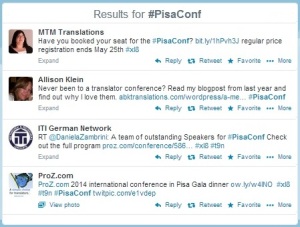This is the third post in a “Getting the most out of translation industry events” weekly series. As explained in the first part, tips will be grouped into “before the event”, “during the event” and “after the event” for easy reference. Please feel free to post below and share your tip(s)!
Before the event
Tip 2: plan your event
Attending an industry event should be more than just showing up. Yes, signing up and being there are important, but these two may not pay off if not supported by some serious planning. Mind you that planning here does not entail flight and hotel booking, or finding a good friend who is willing to water your plants. Planning your event means preparing yourself to learn, network and have fun.
 If you are planning to attend an industry event, here are some tips for you to start making your own plans:
If you are planning to attend an industry event, here are some tips for you to start making your own plans:
- Carefully pick the sessions you will attend: check the conference program and the learning objectives of each session. Keeping in mind your own learning objectives and your business plan, sign up for sessions that will provide you with information that you don’t have and that could help you to improve your work and expand your business (i.e. presentations that you could not give yourself).
- Prepare questions: once you have signed up for sessions of your interest, prepare a set of questions for which you would like answers. You may ask these questions during the QA portion of the session, or to the speaker during a coffee break or at lunch.
- Know the speakers: familiarize yourself with speakers, know their names, their background and the presentations they will be offering. Remember that, even if you are not attending a given speaker’s session, you will still have plenty of opportunities to network with them and discuss topics of interest to both.
- Know the sponsors: in general, translation industry events are sponsored by companies that are also part of this industry and that may offer a wide range of solutions to language professionals. Find out who is sponsoring the event you are attending and what they offer. Do they sell language services? If so, are they hiring? Do they sell translator software tools? Which ones? Can you get a demo for free?
- Spot attendees with common interests: if there is a list of attendees available, search for colleagues working in your top language pairs and fields of expertise. Get their names and, if possible, contact them in advance and make plans to share a drink. Meeting with colleagues who have the same specialization could help you to learn more about your niche (rates, volume, types of clients, etc.).
- Share your plan with others: now that you are familiar with sessions and have signed up for the ones that interest you, and you know the speakers, the sponsors and a few colleagues with the same interests as you, share your plans with other attendees. Let colleagues know the sessions you are planning to attend and why, the questions you would like those sessions to answer, the speakers you can’t wait to meet. This will encourage other attendees to do the same and set the tone for the event before it even starts. For more pre-event networking tips, see Getting the most out of industry events: Part one and Getting the most out of industry events: Part two.
Remember, if you want to optimize the value of attending an industry event, making plans before attending is as important as showing up that day (if not more!). Think of your plan as a strategy to achieve a return on your investment of time and money into an event. In the end, you will attend an event to network, but also to learn how to do your job better and more efficiently.
Do you make your own plan before attending industry events?
Post below.
The next part in this series will discuss tips to develop a marketing plan before attending an industry event depending on your goal(s).












